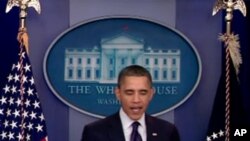The Washington-based Brookings Institution said Africa, to benefit from development opportunities in 2012, must prioritize regional integration efforts and manage a growing youth population.
The public policy organization said the continent will have to increase the profile of organizations, such as the African Union, to sustain advancements in public health and increase the African voice in global governance.
Wednesday, the group’s Africa Growth Initiative hosts a discussion to identify top priorities for Africa for the coming year and beyond.
Senior Fellow Mwangi Kimenyi, director of the Africa Growth Initiative, said, if re-elected in November, President Barack Obama must take a pro-active policy position that encourages more engagement with Africa.
“What we are seeing is sort of what we may call a decline of the United States in Africa because it is being edged out slowly by China, Brazil, Russia, and others. And so, we would like to see President Obama take a very pro-active policy position with regards to Africa,” he said.
Kimenyi said Obama, in his first term, maintained funding for programs initiated and promoted by his predecessor, George W. Bush, including HIV and AIDS treatment and research funding.
He also said while the president introduced his own initiatives, such as the Feed the Future program and the Global Climate Initiative, such initiatives are small in scale and scope.
In a recent opinion article in the British Guardian newspaper, Kimenyi argued that, if Obama is re-elected, he should advocate for more U.S. investment in Africa.
He said US and African economies would benefit by prioritizing trade and investment over foreign aid.
“I have to say that the president has done well in terms of programs like food and health. But, what Africa needs is economic growth. Africa needs to create jobs and get out of this idea of dependence, and we think that the best way to do that is through investment,” Kimenyi said.
He said, while aid is important, partnerships based on trade, investment, and joint ventures are much more important.
Kimenyi said the US must do more to combat what he calls its declining commercial relationship in Africa and China’s growing influence.
“The US has been a partner in Africa in terms of investment and development programs. But, when you compare what has happened in the last five to ten years, what you see is that China has literally invaded Africa in all aspects. So, if you compare China’s rise in Africa in terms of involvement, you find that actually the United States’ influence in Africa, particularly commercial relations, is declining,” he said.
Obama visited Egypt and Ghana soon after he was elected in 2008. Kimenyi said, if re-elected, the president should visit a number of Africa countries, this time accompanied by business executives
“What we would like to see is that he should visit several African countries; he should not go there with just government officials; he should go there with investors,” he said.
He said the priorities will remain the same whether Obama is re-elected or not.
“We have looked at these priorities from the perspective of Africa. So, whoever is elected as president, what we want [is to] engage Africa, what we want to communicate is that Africa is not a basket case; Africa should not been seen from the eyes of just aid. We should look at Africa as an opportunity for the United States to grow,” Kimenyi said.
He said Obama still has a chance to leave a US legacy in Africa, particularly if he follows the vision he articulated for the continent during his 2008 visit.




